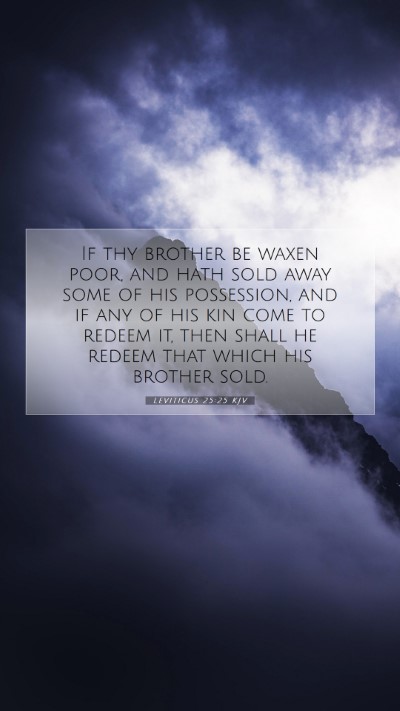Understanding Leviticus 25:25
Leviticus 25:25 states: "If your brother becomes poor and sells some of his possessions, then his nearest relative may come and redeem what his brother has sold." This verse is part of the laws concerning the Jubilee year and emphasizes the importance of redemption and social responsibility in the community of Israel.
Bible Verse Meaning and Interpretation
This verse highlights key themes surrounding poverty, community support, and the right of redemption:
- Social Responsibility: The verse demonstrates the obligation of community members to look after one another, particularly during times of economic hardship. Families bore the responsibility to help each other, signifying the communal aspect of their society.
- Redemption: The notion of a "nearest relative" coming to redeem possessions reflects a legal and moral tradition that is crucial for ensuring that families retain their heritage and land. This redemption process not only provides financial assistance but also restores dignity and hope to those who are struggling.
- Divine Law: This legislation underscores God's concern for justice and mercy within the community, illustrating His desire for equitable treatment for all, especially the downtrodden.
Biblical Exegesis and Commentary
Insights from various public domain commentaries shed light on the significance of this verse:
Matthew Henry’s Commentary
Matthew Henry emphasizes that this command was set to prevent the total loss of a person's inheritance. He notes that the law reflects God's providential care for His people, ensuring that familial bonds and properties are preserved throughout generations.
Albert Barnes’ Notes
Albert Barnes highlights the importance of the “kinsman-redeemer” concept in Israelite culture, drawing attention to the fact that personal redemption acts as a protective measure for vulnerable family members. Thus, the principle of kinship is reinforced, showing the interdependence of community members.
Adam Clarke’s Commentary
Adam Clarke reflects upon the societal implications of this law, indicating that maintaining ancestral land is critical to preserving the identity and stability of families. He also points out that this principle of redemption extends beyond the immediate context, demonstrating a broader divine principle of restoration and hope.
Bible Study Insights
In delving deeper into Leviticus 25:25, the following insights can help enhance understanding:
- Historical Context: Understanding the historical and cultural backdrop of Ancient Israel is essential for grasping the significance of land ownership and family lineage.
- Application: The principles taught in this verse can be applied to modern-day community support practices, encouraging individuals to assist those facing financial struggles.
- Spiritual Redemption: The concept of redemption extends into the New Testament, where Christ is seen as the ultimate redeemer, providing a deeper spiritual meaning to the practice of helping others.
Cross References
Leviticus 25:25 relates to several other scriptures that expand upon the themes of redemption and social justice:
- Ruth 2:20 - The story of Boaz as a kinsman-redeemer.
- Proverbs 22:22-23 - Warnings against exploiting the poor.
- Galatians 4:4-5 - Christ as the redeemer of those under the law.
Conclusion
Leviticus 25:25 serves as a profound reminder of the care and compassion expected within a community, advocating for the protection and assistance of the vulnerable. By examining this verse through the lenses of various commentaries, believers can gain a richer understanding of its implications both socially and spiritually. This verse stands as a call to apply biblical principles of redemption and kinship in today's context.


